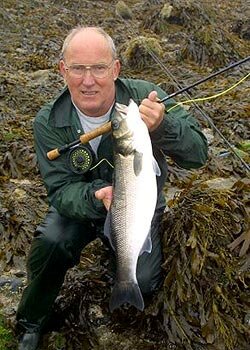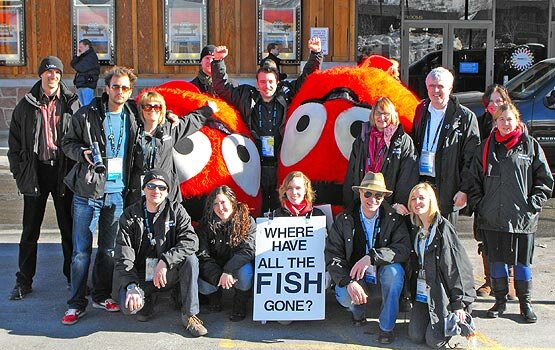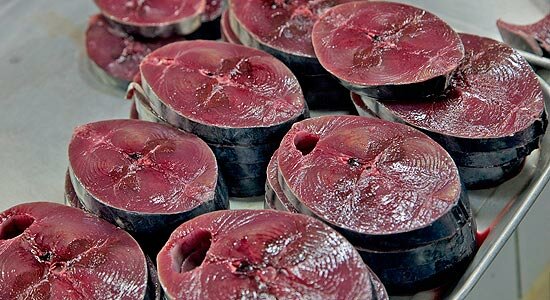Author's blog
As we celebrate the first ever World Oceans Day, I find myself doing so with mixed emotions. Without a doubt it is time the oceans got the recognition they deserve - they are stunning, full of incredible diversity and immeasurable beauty.
- We need your help to protect Sierra Leone from illegal pirate fishing - Environmental Justice Foundation

In Sierra Leone 80 per cent of animal protein in the average diet comes from the ocean
As a child I grew up by the ocean, on the oceans, and whenever possible in the oceans, and they are a fundamental part of my life. I feel blessed that I get go to work every day and work to save the oceans.
There is no doubt that they need saving. It’s become very clear that the oceans, that for so long seemed so vast, are far from infinite.
We are putting them under incredible pressures, and the impacts of pollution, acidification and climate change are adding up fast.
It is now very clear that we are completely over-fishing our oceans, starkly demonstrated by The End of the Line.
That 80 per cent of global fish stocks are fully exploited or depleted, and the prediction that we’ll run out of fish by 2048, is pretty scary.
I realise that for many these figures seem far from home. Not for me. My job as an oceans campaigner has taken me all over the world to investigate illegal fishing, which is both a cause and effect of over-fishing.
I’ve seen the jagged holes left in coral reefs after they’ve been dynamited, and been appalled as a live shark had its fins cut off for the soup trade, and was then dumped over the side still desperately trying to swim. Continue reading ‘We must end overfishing to help developing countries that depend on oceans to survive’

Charles Clover, author of The End of the Line and one of the stars of the film, has talked to Fork in the Road, the food blog for Village Voice in New York.
He outlines his concerns about overfishing, the solutions that are currently in place and why we shouldn’t assume we live in a world of plenty. He also talks about whether he eats fish, he says:
“Yes, but less than I did. I am mightily confused by whether any farmed fish is sustainable and I would just prefer to eat the little fish that they feed to carnivorous fish . . . . I like mackerel, which is now MSC-certified, and have learned that it makes wonderful sushi straight out of the sea with English mustard, as Hugh Fearnley-Whittingstall serves it.”
To read the full interview see No Fish by 2048? The End of the Line–Interview with Journalist Charles Clover on the Fork in the Road on Village Voice.

What were thought of as certainties can fall apart in the light of new circumstances, new thinking.
For years we have been told that the Omega 3 fatty acids from oily fish such as salmon, tuna and mackerel are good for the heart and brain.
Now, some of the people who proved that the world’s fish catches were not rising but falling - a critical milestone in this century’s thinking - have produced a report that shows that the evidence for the beneficial effects of Omega 3s is somewhat less impressive than one might think.
The study actively challenges dietary advice that we actually should be eating more oily fish.
It says that people in the Northern hemisphere who eat a balanced diet may be getting enough Omega 3s anyway but people in the Southern hemisphere are having their essential proteins and fish oils stolen from them by diet faddism in the North.
Oily fish can actually be bad for overweight or unhealthy people with heart problems, it says.
Was the fad for Omega 3s perhaps just a marketing strategy worked up by the fishing industry? That’s going too far, but it certainly looks as this dietary obsession is something we should be looking at a whole lot more critically now we know that wild fish stocks are in trouble almost everywhere.
Policies can be skewed by vested interests - including our own perceived health interests.
In fact what the human race needs are balanced policies that promote healthy people and healthy wild fish populations, able to feed a human population that will rise by a third over the next half century.
That is what we should be planning for, together with ways of producing Omega 3 fatty acids from vegetables and algae, to take the pressure off fish.
In the meantime, we may actually need to eat less of certain fish - salmon and tuna for instance - rather than more as the dieticians have been calling for.

Hungry sharks have attacked three people in the past three weeks off Sydney, Australia.
One of the explanations offered by the BBC is that cleaner waters and a ban on commercial fishing, which has attracted more fish to the area, could be responsible for luring the oceans’ big predators closer to Sydney’s beaches and harbour.
That is an extraordinarily cynical explanation, if you think about it, and one the BBC should be ashamed for reporting.
If you follow the logic of the Australian source quoted by the BBC, it would be safer to go polluting the sea until the water turns brown and to have fish exterminated within miles of the shore so that at least you aren’t attacked by sharks. Bruce, do me a favour.
There is a much more plausible explanation contained in the two-yearly report on the state of the world’s fish stocks published today by the UN Food and Agriculture Organisation (FAO).
The report shows that the number of the world’s fish stocks ranked as over-fished, depleted or fully exploited increased to 80 per cent – a rise of three per cent in two years.
The only sensible explanation for this is the world’s fishing fleets remain out of control and politicians are unaware or unwilling to do something about the problem.
Check out another report today, Hungry Oceans: What happens when the prey is gone?, compiled from scientific sources by the environmental group Oceana. This shows that scientists around the world are reporting ocean predators emaciated from lack of food, vulnerable to disease and lacking the energy to reproduce.
Scrawny dolphins, whales, tuna and bass have been reported along coastlines around the world.
At the same time, we continue to hunt their prey, the small fish such as herring, menhaden, anchovy and sand eel which the major predators depend on, to provide feedstock for the fast-growing fish farming industry. We have forgotten to leave enough fish in the sea for predator fish.
Isn’t lack of food the most likely explanation for the strange behaviour of sharks off Sydney?
And isn’t the creation of larger areas, offshore, where the bounty of the sea can recover a more plausible way of solving the problem than allowing the seas off Sydney to get polluted again and over-fishing to resume?

I am a sea angler. I am in this film – fishing for bass on the Blackwater estuary in Essex – and took part in it because I share the view that modern fishing technology in the hands of a few people is destroying the value of the sea for millions of citizens.

Bob Cox with a bass he caught
That is how it is in Europe, anyway.
In England, we fondly talk about the USA as being just the other side of the pond but as far as fisheries management is concerned, it may as well be the other side of the galaxy.
In the USA, recreational sea angling is recognised as a legitimate use of many species of fin fish. There, fish that are of great importance to sport fishermen are managed so that anglers get the major share of the allowable harvest.
On the East Coast for example 90 per cent of the striped bass are allocated to recreational fishermen; commercial fishermen get what’s left.
Here in Europe our bass, now re-branded by smart restaurants as “sea bass”, were until the last 30 years almost exclusively “the angler’s fish,” held in the highest esteem by all who fished for them with rod and line.
Bass rods, bass lures and bass boats were all produced in pursuit of the bass.
Then came climate change, here in N W Europe it kicked in round about 1989 when warmer spring and winter seas allowed millions of bass fry to survive and throughout the 1990s bass production trebled.
This should have been good news for sea anglers but by then the commercial fleet aided and abetted by Government and the EU’s Common Fisheries Policy had already reduced the most important commercially fished species, such as cod, haddock and plaice to a tiny fraction of their original abundance.
With nothing much left to fish for, they turned their massive, efficient catching machines on bass. Continue reading ‘What’s bad for fish is bad for people’

Well, we are just back from the Sundance Film Festival and what it all means is only just beginning to sink in. The audiences loved our film, which warns that this may be the end of the line for fish in the world’s oceans, unless we take care. All our screenings were packed and followed by spirited Q&As.

Rupert Murray is interviewed for Italian television
Perhaps the most gratifying were the two screenings in Salt Lake City because the audiences were made up of members of the public - one was before 200 High School children who asked the best questions of the festival.
Number one, from a 16 year old boy, “Will there be fish to eat when I’m a grandfather?” Good question.
Being so close to the subject for so long, it was easy for us to forget just how shocking and how surprising the story of what is going on in the sea is to most people.
Even the questioner who said he knew most of the facts fell silent when we told him that in the week we arrived there was a piece in Science linking the depletion of fish in the world’s oceans with global warming, and confirming our worst predictions about the sea.
Ours was a very big subject indeed. We hope we have done it justice. Certainly our audiences thought we did.
What many people who saw the film commented on was the fact that there was an optimistic ending: we can do something about the destruction of the oceans if we act now. Continue reading ‘Back home after the genius of the Sundance Film Festival’

There have been moments during the production of The End of the Line when we have felt that someone up there wanted this film to be made and to be seen by as many people as possible.
It happened again as we arrived in Park City, Utah, for the Sundance Film Festival.

The End of the Line team after the world premiere
Jeff Hutchings, a professor from Dalhousie University, Canada, travelled here at his own expense just to be part of the excitement and see himself in the film.
On arrival he handed us a cutting of a story from Science: the first proof of a link between global overfishing and climate change.
Continue reading ‘World premiere of The End of the Line’

When the history of the last half century is written, will we think that governments, scientists and environmental leaders identified the right global problems and got to grips with them, as the human population doubled, and looked like doing so again?

Fish steaks - Rampant, uncontrolled fishing is already pushing whole species, such as the magnificent bluefin tuna towards extinction
Or will we think that huge problems emerged on our watch while reason slept?
The inconvenient truth about the sea, which covers 70 per cent of the Earth, is that arguably the worst impact upon it so far – if you study the latest scientific assessments - has been caused by the mundane pursuit of human food and not by global warming or acidification, major threats though these are to our common future. Continue reading ‘The inconvenient truth about the sea’


![]()






